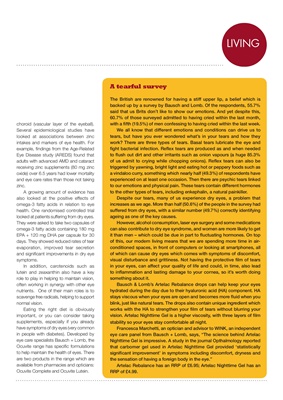
KITLIVING
choroid (vascular layer of the eyeball).
Several epidemiological studies have
looked at associations between zinc
intakes and markers of eye health. For
example, findings from the Age-Related
Eye Disease study (AREDS) found that
adults with advanced AMD and cataract
receiving zinc supplements (80 mg zinc
oxide) over 6.5 years had lower mortality
and eye care rates than those not taking
zinc.
A growing amount of evidence has
also looked at the positive effects of
omega-3 fatty acids in relation to eye
health. One randomised controlled trial
looked at patients suffering from dry eyes.
They were asked to take two capsules of
omega-3 fatty acids containing 180 mg
EPA + 120 mg DHA per capsule for 30
days. They showed reduced rates of tear
evaporation, improved tear secretion
and significant improvements in dry eye
symptoms.
In addition, carotenoids such as
lutein and zeaxanthin also have a key
role to play in helping to maintain vision,
often working in synergy with other eye
nutrients. One of their main roles is to
scavenge free radicals, helping to support
normal vision.
Eating the right diet is obviously
important, or you can consider taking
supplements, especially if you already
have symptoms of dry eyes (very common
in people with diabetes). Developed by
eye care specialists Bausch + Lomb, the
Ocuvite range has specific formulations
to help maintain the health of eyes. There
are two products in the range which are
available from pharmacies and opticians:
Ocuvite Complete and Ocuvite Lutein.
A tearful survey
The British are renowned for having a stiff upper lip, a belief which is
backed up by a survey by Bausch and Lomb. Of the respondents, 55.7%
said that us Brits don't like to show our emotions. And yet despite this,
60.7% of those surveyed admitted to having cried within the last month,
with a fifth (19.5%) of men confessing to having cried within the last week.
We all know that different emotions and conditions can drive us to
tears, but have you ever wondered what's in your tears and how they
work? There are three types of tears. Basal tears lubricate the eye and
fight bacterial infection. Reflex tears are produced as and when needed
to flush out dirt and other irritants such as onion vapours (a huge 85.3%
of us admit to crying while chopping onions). Reflex tears can also be
triggered by yawning, bright light and eating hot or peppery foods such as
a vindaloo curry, something which nearly half (49.3%) of respondents have
experienced on at least one occasion. Then there are psychic tears linked
to our emotions and physical pain. These tears contain different hormones
to the other types of tears, including enkephalin, a natural painkiller.
Despite our tears, many of us experience dry eyes, a problem that
increases as we age. More than half (50.6%) of the people in the survey had
suffered from dry eyes, with a similar number (49.7%) correctly identifying
ageing as one of the key causes.
However, alcohol consumption, laser eye surgery and some medications
can also contribute to dry eye syndrome, and women are more likely to get
it than men - which could be due in part to fluctuating hormones. On top
of this, our modern living means that we are spending more time in airconditioned spaces,
in front of computers or looking at smartphones, all
of which can cause dry eyes which comes with symptoms of discomfort,
visual disturbance and grittiness. Not having the protective film of tears
in your eyes, can affect your quality of life and could, in time, also lead
to inflammation and lasting damage to your cornea, so it's worth doing
something about it.
Bausch & Lomb's Artelac Rebalance drops can help keep your eyes
hydrated during the day due to their hyaluronic acid (HA) component. HA
stays viscous when your eyes are open and becomes more fluid when you
blink, just like natural tears. The drops also contain unique ingredient which
works with the HA to strengthen your film of tears without blurring your
vision. Artelac Nighttime Gel is a higher viscosity, with three layers of film
stability so your eyes stay comfortable all night.
Francesca Marchetti, an optician and advisor to WINK, an independent
eye care panel from Bausch + Lomb, says, "The science behind Artelac
Nighttime Gel is impressive. A study in the journal Opthalmology reported
that carbomer gel used in Artelac Nighttime Gel provided 'statistically
significant improvement' in symptoms including discomfort, dryness and
the sensation of having a foreign body in the eye."
Artelac Rebalance has an RRP of £6.95; Artelac Nighttime Gel has an
RRP of £4.99.